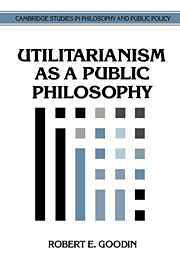Book contents
7 - Apportioning responsibilities
Published online by Cambridge University Press: 28 January 2010
Summary
The preceding chapter was essentially a softening-up exercise, showing that the deontologists' model of blame-responsibility was incomplete even in its own terms. Next, I want to mount a more positive case for the relative superiority of consequentialistic utilitarian accounts of task-responsibility over deontological models of blame-responsibility, based on the problem of apportioning responsibilities among participants in some joint endeavor.
The argument of this chapter starts from many of the same commonplaces as that of the preceding one. Maybe occasionally individuals act alone, one individual bearing exclusive responsibility for some particular state of affairs. More commonly several individuals act together, “sharing responsibility” (in some sense or another) and, indeed, sharing it differentially. There, responsibility is neither exclusive nor equal. Some people bear rather more responsibility, others rather less, for one and the same state of affairs.
That is simply to say that we characteristically find ourselves apportioning responsibility between different agents. In itself, that observation seems unexceptional and unexceptionable. Upon further inspection, however, it turns out that that observation is not nearly so idle as it seems. That we apportion responsibility, and how we do so, in the end tells us something important about the nature of responsibility itself. For it is only on certain models of moral responsibility – the standard model, extraordinary as it seems, not being among them – that that practice makes sense.
- Type
- Chapter
- Information
- Utilitarianism as a Public Philosophy , pp. 100 - 114Publisher: Cambridge University PressPrint publication year: 1995
- 1
- Cited by



